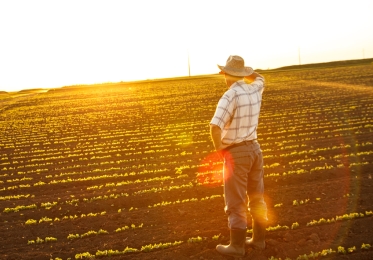30 June 2017
 Knowing just how to speak to farmers to gain their trust and engagement could be a key factor in protecting the mental health of one of Australia’s highest risk groups for suicide.
Knowing just how to speak to farmers to gain their trust and engagement could be a key factor in protecting the mental health of one of Australia’s highest risk groups for suicide.
New research from the University of South Australia, PhD candidate Melissa Hull and a team of researchers including Associate Research Professor and Project Director, Department of Rural Health, Dr Martin Jones have assessed the differences between farming and non-farming rural adults to discover what stops them from using mental health services.
The report entitled A comparison of barriers to mental health support-seeking among farming and non-farming adults in rural South Australia was published in the Australian Journal of Rural Health recently and Hull wants policy-makers at all levels to “explore how best to develop proactive health decision-making in this vulnerable population”.
The study captured responses from 203 people from three rural regions in South Australia, offering insights into the values and attitudes that make farmers and non-farmers reluctant to access mental health services.
“What we really wanted to pin down with the study was, do farmers have a really different set of values and circumstances that might put up barriers to getting help when they need it,” Hull said.
“We used a broad scale that considered a number of different groups of barriers and identified differences between the farmers and non-farmers.
“And the evidence suggests rural Australians prefer to seek non-professional support to manage health concerns, and they have a real desire to be independent and maintain pride, all of which may delay or even stop them from seeking mental healthcare or support.”
The study found that traditional rural stereotypes like self-reliance and stoicism (endurance of pain without complaint) were somewhat supported.
“The largest difference we found between farmers and others was around communication with health professionals, where farmers were more likely to agree that communication was a barrier,” Hull says.
“This implies that there may be a disconnect between how some health professionals communicate with farmers and what farmers find comfortable, and that may add to the challenge of accessing services for mental health concerns.
“Mental health services and professionals in rural Australia might need to adapt their practices to successfully engage this population.”
Associate Professor Martin Jones explains how the study will impact on UniSA’s Department of Rural Health (DRH).
“The findings will inform the development of UniSA’s DRH workforce development programs to provide a stronger focus on the recognition of mental health conditions rural South Australians may be experiencing,” Prof Jones says.
“The DRH will reflect as to how we can deliver workforce and community engagement activities to build the social capital of rural communities.
“This is vital to attracting the future workforce to ‘go bush’ and support rural communities to provide a holistic training experience for the future workforce in rural South Australia not available in Adelaide.”
A comparison of barriers to mental health support-seeking among farming and non-farming adults in rural South Australia by Melissa J. Hull, Kate M. Fennell PhD, Kari Vallury, Martin Jones PhD and James Dollman PhD in Australian Journal of Rural Health
Media contact: Georgia Aish mobile: +61 435 658 176 email: Georgia.Aish@unisa.edu.au



